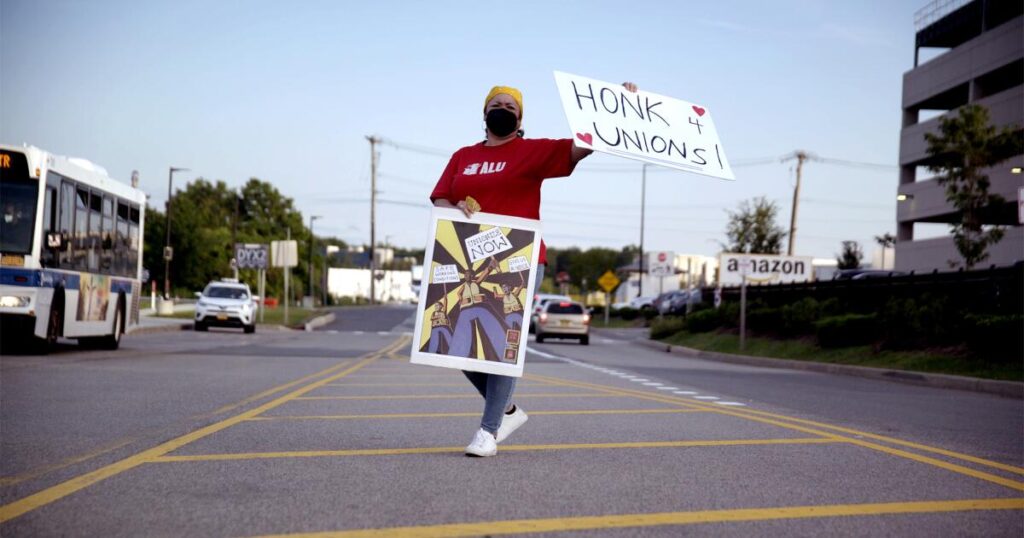[ad_1]
“Union” is not your grandmother’s organized labor documentary. The film, about the efforts of a group of workers at a Staten Island Amazon warehouse to unionize their colleagues, fits broadly into a lineage of nonfiction classics that includes Oscar winners “Harlan County USA” and “American Factory.” But for co-director Brett Story (“The Hottest August”), there was something new to the tale.
“Right away, I recognized an opportunity to tell a labor story set in the context of today’s economy, which is a very different economy from a lot of the canonical labor films,” Story says during a recent joint conversation with fellow filmmaker Stephen Maing (“Crime + Punishment”) via her cellphone, fresh off a plane in Toronto, where she lives. “It would be a film about gig workers, about the global supply chain and about a new generation of activists.”
The film opens with a shot of the 2021 Blue Origin manned rocket launch carrying Amazon founder Jeff Bezos into space. Back on the ground, the camera observes Chris Smalls, a former Amazon employee dismissed the year before from the JFK8 fulfillment center for his activism over proper measures to protect workers from COVID. Smalls puts his charisma to use, manning a barbecue grill in a tent outside the warehouse, where he’s trying to enlist his former colleagues to the cause as they come off an 11-hour shift.
The filmmakers hang close by throughout the effort, which after a successful 2022 vote led to the Amazon Labor Union becoming the first independent Amazon union in the country. This year, the union affiliated with the Teamsters, although Amazon has so far declined to negotiate a contract.
Throughout, “Union” frames the struggle within a tremendous irony, as the employees strain to see a better future at a company with “a business model that is built off a 150% turnover rate and churning through the workforce, as opposed to building it up,” Maing says. “These people live in such a constant state of contradiction. To be told you’re essential, but be treated as though you’re expendable, told your company is making record profits [but] your wages are stagnant and you haven’t gotten a raise in six years.”
The fight is rugged, and Smalls, a former rapper and father of three, leads a core of activists from a wide range of social, racial and economic backgrounds down an exhausting, obstacle-strewn path to victory. Fault lines crack across the group, with clashes not only over potential alignments with larger, more established unions but also with Smalls, whose headstrong persona plays vividly on national media but generates tension within the ranks. The film finds a rich thread in exploring all this.
“The question for us is, ‘Who comes to this kind of struggle?’” Story says. “What is this strange amalgam of people? Some of them are friends. Some of them not. Some of them have moved across the country to be part of this organizing effort. Some of them have worked at Amazon for a long time. Some of them don’t. Some of them live out of their cars. … There was some sort of alchemy in this group that drew people to the struggle and made them commit over the long term.”
The film’s warts-and-all perspective emphasizes the human factor rather than tracking a conventional model of underdog heroics. “It can be hard watching yourself on screen, especially when you’re going through your own evolution of thinking and feeling,” Story says. “Those experiences were painful and stressful. But nobody asked us to change anything. I think they felt grateful that we weren’t giving just a romantic version.”
Mainstream distribution still eludes “Union” despite the filmmakers’ best efforts. “Amazon is among the six or seven media conglomerates that control the entertainment industry … so we weren’t surprised,” Maing says. Instead, the film is being distributed independently pending a more official arrangement.
The filmmakers can certainly take inspiration from their subjects, who consistently rallied during unpredictable occasions. During a typically grueling marathon shoot, Maing recalls waking up from a quick nap to screams as the organizers’ tent was caught by a massive wind gust.
“Chris and another organizer named Josiah were out there, almost being swept up by this tornado-force wind,” he says. “It was such a viscerally metaphorical moment. If you thought things couldn’t get any worse, they continually can in this fight with Amazon. Yet the response was them continuously trying to just pull themselves up by the bootstraps.”
[ad_2]
Source link

